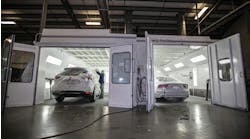Business culture encompasses a variety of elements, including work environment, company mission, leadership style, values, ethics, expectations, and goals. Just like any other business, repair shops need a culture for their employees in order to thrive.
One of DRIVE’s shop owners, Gerardo Luna (best known as JR), knows firsthand how important shop culture is. JR is the President and General Manager of three auto repair shops (soon to be four!) in the Ventura County area of Southern California. In his 26 years of experience, JR has performed and/or supervised over 90,000 repairs. He holds a Master Technician Certification from ASE (including service adviser) and also earned a Master’s Award in Shop Management from DRIVE. In addition, JR holds a B.A. in Business Management from the University of Phoenix.
Despite his extensive background in automotive repair and business, JR attributes a big part of his success to his talented team. Learn how he and his team are able to work together and thrive with a strong shop culture. Take it away, JR.
The roots of establishing shop culture
I have been in the automotive service industry since 1995. Having worked for a large chain for years, I knew what I didn't want to become in terms of a being a shop owner and my shop’s culture. I’m genuinely a people-person and one thing that I know about myself is that I campaign for a good mood, even during tough times. I think a positive mood has a better chance against even the hardest of problems. I do get mad and upset, but it doesn't help solve anything.
For me, shop culture is our identity. It's our beliefs in action. If culture was part of a song, it would be the melody. Shop culture is the lens through which we see and do everything.
Philosophy and culture really go hand in hand. As a shop owner we can have all the policies and procedures written down and followed exactly. What you will soon find out is that two people saying and/or doing the same thing will have completely different outcomes. What’s the difference? It’s the attitude that was brought in by that person. Where do they get the attitude? It's from the culture that is all around them; it’s the melody of the song that constantly plays in the shop. Obviously, we have policies and procedures, and we present them by stating our desired outcomes, setting guidelines and boundaries, etc. However, it is the culture behind those policies and procedures that creates the desired execution and, ultimately, the desired results, which are a lot more than just profits.
Shop culture in action
Culture dictates the way we handle the customer and the driving force behind our performance. It dictates the attitude, beliefs, and actions of the business. It dictates whether someone is going to try their best to get a job done before the end of day or the attitude that there’s always tomorrow. Culture is a service advisor setting up transportation for a customer when they know their car would be delayed a day, or the advisor caring just enough but not enough to make it his or her problem.
At a simple view, one might think in this example that it's an employee’s attitude or capabilities. However, it is not the employee involved. Under the right shop culture, almost any employee could make great decisions based on the culture. Shop culture creates a narrative that dictates the sentiment and ultimately produces the actions taken by most employees. Think of a time when you played sports, and you believed in the narrative of the team. If you played for a high school team, then you know that you'd do anything to gain for and defend your team. You’d work as hard as you could and live up to or even exceed the expectations. Our shops are not that different. Our employees have pride wearing our shop's name on their shirt; it brings them pride to belong to a high-performing team where they feel valued. If you can create a shop culture where the employees are proud of being a part of, then you're doing many things right.
When I visit my three shops, I listen and observe. I can almost feel the mood in the air. I observe who’s having a good day and who has a scowl on their face, and I try to find out why. I observe how our customers are being treated and communicated with, what is being offered at the counter. I observe internal employee communication and interaction between the team. If there's anything going on that can potentially scale up and ruin attitudes, that needs to be dealt with immediately. Sometimes I need to get involved; however, most times I communicate my observations with the leader in charge and let him handle it, as it is important that I don't undermine the chain of command. It is also important for each location to get good at dealing with their own issues.
My most important duty is to deliver gratitude and praise to each employee. My second duty in terms of importance is to train and develop leaders. Leaders are a scarce resource on this planet, and it is key for any organization to grow. It is also important to share our wins, any good news and also where adjustments need to be made in order for the team to succeed and win.
Identifying clear individual expectations, goals and team goals is a big part of our culture too, because objectives become measurable and we know whether we are on the right track. High achievement is celebrated and is part of our culture. Some employees will embrace the new culture, and some won’t.
I often hear about a great talented employee that a shop owner is thinking about hiring. However, the question that rarely gets discussed is “Will they fit our beliefs and culture?” Every shop has a culture whether we like it or not. We either created it or let it create itself through the beliefs and habits of the collaborative inputs of all the employees that ever worked at your shop.
Ensuring consistency across locations
The most important part for me when taking over a shop is introducing our culture. Many shops have identical workflows, software packages and customer intake procedures, etc. The only thing truly unique to your shop is the culture, and no one can duplicate it — it’s the shop's DNA. Every shop we have has a different group of employees from all walks of life — some small organic variation changes to add their own spice and that's ok. It’s unique to that team. However, the overarching culture is 98 percent the same. Having meetings with the crew and sharing my philosophies for the business is a start to achieving consistency. Taking future employees on tours of my other shops has the biggest impact. When they see an organized, clean, efficient shop, packed with work and happy employees and customers, they are ready to embrace what we have to offer because they also want to be part of a winning team. Showing our momentum with the other shops materializes our vision for the new shop, and they embrace it.





